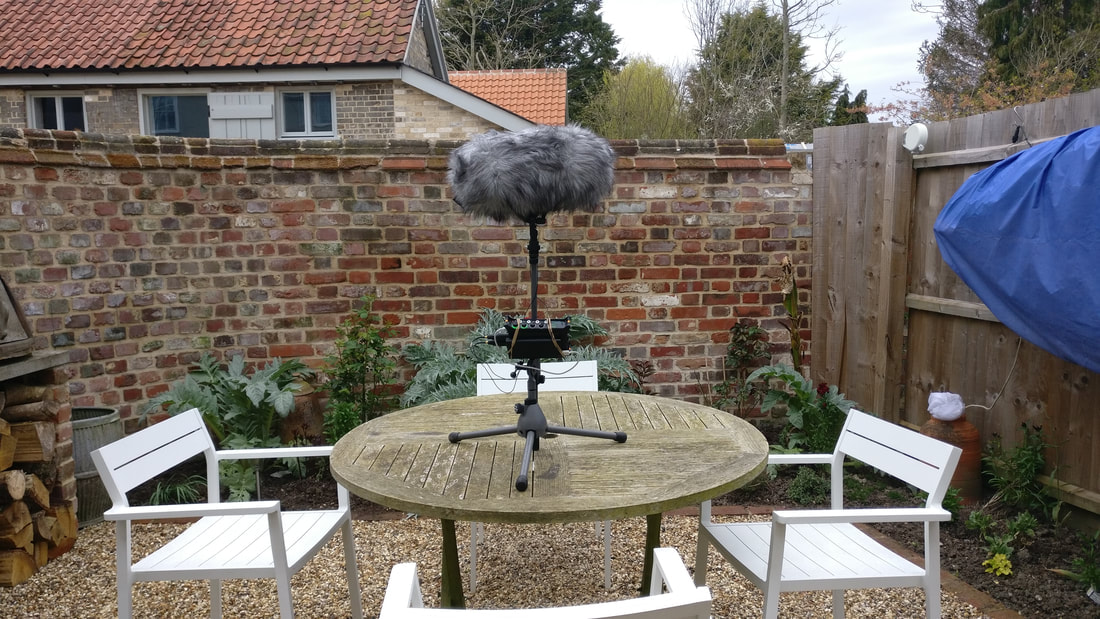|
It’s been a good while since I have written a blog for this project but a lot has been happening recently, for all of us. We are now in week two of the Coronavirus lockdown and my partner and I are finding a new regime for living and working at home. Quite a lot of my creative time is spent working in the studio so I have moved a small amount of equipment home to continue to work from the spare bedroom. But I usually spend a lot of time out in the field collecting sound which under the new lockdown rules classifies as non-essential. This has obviously changed the trajectory of the Resounding project, as it has with all of my work, I remain open to where things can go (reactive rather than proactive?) and will use the time in confinement to push ahead with interpreting the recordings I already have rather than making any new ones. In my blog post of 28th November 2019 I was talking about the impact that I had on the environment and how one's presence changes the behaviour of the wildlife around oneself as they react to your being there rather than proactively going about their business. With this project I don’t have the luxury of leaving my equipment unattended in a location for a long time in order to capture a more unaffected soundscape, as some local field recordists have been doing. I have been listening to Stefan Taylor’s recordings recently and whilst they connect me to river soundscapes in one way, one of the motivations for this project is to get out into the world and experience it for myself and to follow in the footsteps of Baker. He spent ten years cycling and walking around the lanes and sea walls of Essex in pursuit of understanding the Peregrine and from these experiences wrote the book that he is famous for now. I’m not saying that I’m going to create a piece of work as impactful as his, but he would undoubtedly have had an impact on the world around him, scaring Woodcocks from the undergrowth and flushing out Partridges, as he notes in the book. These interactions and his description of them made them accessible and helped us to understand the behaviours of the natural world around us but at what cost to the individual Woodcocks and Partridges? There is a moment in the book where he thinks that the Peregrine recognises him, and that through his regularity and persistence he has become a part of the falcon’s world. Any connection between humankind and other animal species is one to be cherished but will undoubtedly come at a cost to someone or something. We have to share this world with each other and in doing so consider the value of our contributions versus the impact of our actions. Are they essential? Keeping my movements to a minimum during the Covid19 isolation period, I have begun to focus more on my immediate surroundings and am making regular recordings from our back garden. Every Monday morning between 8 and 9 I record the rush hour from our back garden, and have been doing so since one week before lockdown in order to see if there are any discernible differences to the anthropophony, and therefore the biophony, throughout this crisis. I will start to compare these recordings in the coming weeks.
We live on the A131 which is a busy road at the best of times but we have started to notice changes in the amount and kind of traffic under the new self-isolating rules. There are less cars in general, but more lorries and large agricultural vehicles. There are also more people racing their cars on the quieter road, some of them youngsters in a real life version of Grand Theft Auto. Some people really haven’t changed their lives at all though, as from my window I have noticed some people walking past at least three times a day. Where are they going and what are they doing? Are they considering their movements and the very stark potential of their actions? We have also noticed an increase in bird song, which partly must be attributed to the increase of bird activity during spring but also we think that birds are becoming used to less activity and noise made by humans and are expanding their territories further into ours. Although we haven’t got the appropriate means of testing we think that air pollution levels are dropping as we can see more stars at night and get less dirt particles coming through the crack in our front door. If we can notice these things without the need for specialist equipment, then can’t we all? These unprecedented times are a sign that the way we do things, the systems we have in place are not working and are not sustainable, we must all find new ways of being, of interacting with each other and the natural world and that this should definitely be proactive and not just reactive.
0 Comments
|
Details
AuthorInspired by J A Baker's The Peregrine, recording the sonic landscape around the River Blackwater, Essex. Funded by Arts Council England's Develop Your Creative Practice grant 2019 - 2020. Archives
December 2023
Categories |

 RSS Feed
RSS Feed
